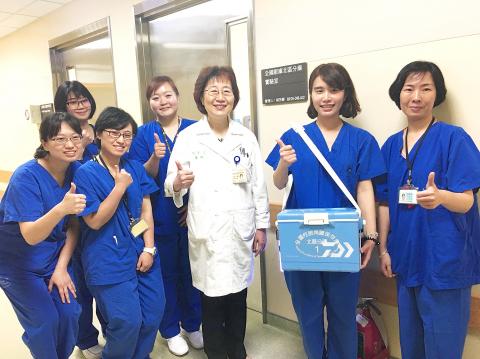A research paper by Taiwanese doctors could change the accepted view that corneas from patients with bacteremia cannot be transplanted and help increase the supply for those awaiting donor corneas.
Standard practice for eye banks is to reject organs donated by bacteremic patients, as they could be contaminated, said National Taiwan University Hospital Department of Ophthalmology director Hu Fung-rong (胡芳蓉), one of the authors of the research paper.
Bacteremia is the condition where bacteria are present in a patient’s blood, which is usually a sterile environment. The cornea is the outer layer of the eye and helps focus vision.

Photo: Lin Hui-chin, Taipei Times
The blood-aqueous humor barrier and the blood-retinal barrier in human eyes make it difficult for bacteria in blood to enter the eyes, Hu said, adding that the cornea itself has no veins and is even less likely to become contaminated.
Recent research has begun questioning the need to reject such tissue from bacteremic donors, which was a catalyst for the research, she said.
The researchers analyzed corneas from 454 donors at the National Eye Bank of Taiwan from January 2014 to June 2017, Hu said, adding that they analyzed 70 sets of corneas from bacteremic donors and 627 sets from non-bacteremic donors.
The blood culture results showed that the average microbial contamination rates of the corneas from bacteremic and non-bacteremic donors were 7.1 percent and 9.1 percent respectively, and they had similar endothelial cell densities, Hu said.
The research paper was on Oct. 15 last year published in the British Journal of Ophthalmology.
Ministry of Health and Welfare Department of Medical Affairs
Director-General Shih Chung-liang (石崇良) on Thursday said that more than 60 percent of corneas for transplant were imported from foreign eye banks, which has consequences for surgery results and costs patients between NT$50,000 to NT$100,000.
The research results could help increase the supply of corneas and further lower the burden on patients, after the National Eye Bank was established in 2013 and the National Health Insurance started covering transplantation costs, Shih said.
Average wait times for cornea transplants have dropped from 123 days to 96.5 days since the eye bank was established, but there is always room for improvement, Hu said.
People should seek a cornea transplant if the top layer of their eye becomes “cloudy” or they develop corneal edema, which can happen due to trauma from traffic accidents, infection or other causes.

The manufacture of the remaining 28 M1A2T Abrams tanks Taiwan purchased from the US has recently been completed, and they are expected to be delivered within the next one to two months, a source said yesterday. The Ministry of National Defense is arranging cargo ships to transport the tanks to Taiwan as soon as possible, said the source, who is familiar with the matter. The estimated arrival time ranges from late this month to early next month, the source said. The 28 Abrams tanks make up the third and final batch of a total of 108 tanks, valued at about NT$40.5 billion

A group from the Taiwanese Designers in Australia association yesterday represented Taiwan at the Midsumma Pride March in Melbourne. The march, held in the St. Kilda suburb, is the city’s largest LGBTQIA+ parade and the flagship event of the annual Midsumma Festival. It attracted more than 45,000 spectators who supported the 400 groups and 10,000 marchers that participated this year, the association said. Taiwanese Designers said they organized a team to march for Taiwan this year, joining politicians, government agencies, professionals and community organizations in showing support for LGBTQIA+ people and diverse communities. As the first country in Asia to legalize same-sex

Travel agencies in Taiwan are working to secure alternative flights for travelers bound for New Zealand for the Lunar New Year holiday, as Air New Zealand workers are set to strike next week. The airline said that it has confirmed that the planned industrial action by its international wide-body cabin crew would go ahead on Thursday and Friday next week. While the Auckland-based carrier pledged to take reasonable measures to mitigate the impact of the workers’ strike, an Air New Zealand flight arriving at Taipei from Auckland on Thursday and another flight departing from Taipei for Auckland on Saturday would have to

MOTIVES QUESTIONED The PLA considers Xi’s policies toward Taiwan to be driven by personal considerations rather than military assessment, the Epoch Times reports Chinese President Xi Jinping’s (習近平) latest purge of the Chinese People’s Liberation Army (PLA) leadership might have been prompted by the military’s opposition to plans of invading Taiwan, the Epoch Times said. The Chinese military opposes waging war against Taiwan by a large consensus, putting it at odds with Xi’s vision, the Falun Gong-affiliated daily said in a report on Thursday, citing anonymous sources with insight into the PLA’s inner workings. The opposition is not the opinion of a few generals, but a widely shared view among the PLA cadre, the Epoch Times cited them as saying. “Chinese forces know full well that